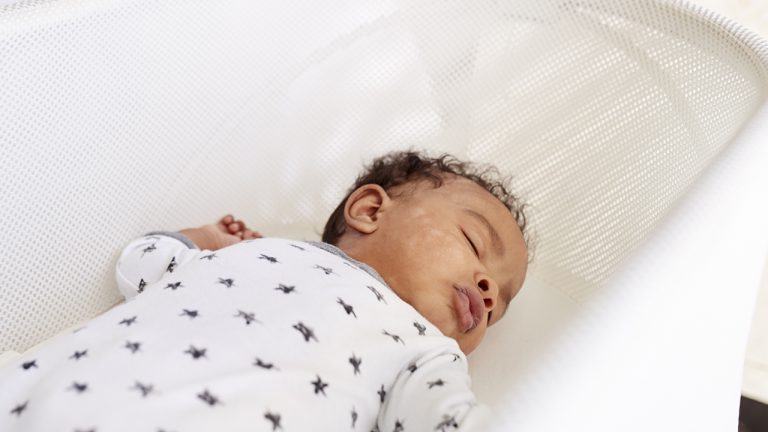
How Long Should Newborns Nap? Everything You Need To Know About Baby Nap Durations
- Created:
27. 7. 2023 - Updated:
15. 2. 2024
Is your newborn having adequate rest?
This may seem like an easy question, but is it?
Two things:
As a parent, you may feel you’re doing a great job with scheduling naps for your newborn.
Likewise:
You may find it difficult to know if your newborn has had a proper nap. This begs the question:
How long should newborns nap?
Join me as I explain everything about newborns’ napping, including tips for scheduling naps and factors that affect nap duration.
How Long Should Newborns Nap? Determining the Appropriate Nap Length for Your Baby
On average, newborns nap between 2 to 5 hours. Other times, they may nap for as little as 30 minutes. These naps are usually spaced between meals and can occur up to five times a day. But as newborns mature, their sleep duration adjusts to that of adults.
Average Nap Duration For Newborns
Truthfully:
Everyone needs sleep, and it is quite evident that newborns are not exempted. And for newborns to grow and develop properly, there is an average nap time that should be met.
The Nationwide Children’s Hospital reports that most newborns nap between 2 to 5 hours during the day. But interestingly, some nap between 30 minutes to 2 hours.
Why is this so?
Well, some underlying factors may hinder proper nap duration, such as excessive light, the nature of the sleep environment, and hunger.
Conversely:
The right sleeping conditions aid in adequate nap time. Hence, the varying nap durations.
Nonetheless:
Newborns’ nap times and schedules will change almost as much as they do during their first year. Therefore, as they grow older, their nap time also reduces.
Factors That Affect Nap Duration
News:
Sleep is to newborns what data is to artificial intelligence; it is never enough and is critical to their development.
However:
The duration at which newborns nap depends on various factors, including hunger, fatigue level, and stimulation. Since sleep is important for newborns, you must pay closer attention to these factors to ensure your baby gets adequate rest.
Moreover:
It gives you the opportunity to respond to your baby’s needs promptly if you notice an anomaly in its napping. Now, let’s discuss some of these factors below:
1. Sleep Environment
Note this:
The sleeping environment of a newborn greatly determines the quality of their sleep. As such, you must be concerned about how comfortable and safe the space is. In addition, be mindful of the mattress’s firmness, the crib’s sturdiness, and the texture of other beddings.
Instead of using soft beddings and mattresses, ensure they’re firm and devoid of extremely fluffy pieces around. These could conform to your newborn’s body shape and also create pockets of trapped air.
Consequently:
Your newborn might inhale expired air while at risk of suffocation and Sudden Infant Death Syndrome (SIDS).
Also, noise, excess light, and heat are potential nap disruptors for newborns.
Even as adults, we find it difficult to nap in an environment that is stuffy or congested with these elements. If you then subject your newborn to these conditions, it shouldn’t be a thing of surprise to find them struggling to nap properly.
Hence:
Monitor the sleeping area and ensure your newborn is comfortable enough to nap in it.
2. Hunger
Get this:
Hunger is highly crucial to look out for when your newborn is failing to sleep. When babies are hungry, they tend to wake up frequently.
In addition:
Hunger cues are one of the ways that babies communicate their needs. If your newborn goes to sleep and wakes up after a short while, there is a high tendency to hunger.
So, what do you do?
Look out for these hunger signs, and then feed your baby right away. Some of them include:
- Fists moving to its mouth
- Head turning to look for the breast
- Sucking on hands or lip-smacking
- Opening and closing of its mouth
3. Illness
As with adults, illnesses are equally a great discomfort for newborns, and the slightest infection is life-threatening for them. In the early developmental stages of newborns, they are more susceptible to diseases, infections, and viruses.
In fact:
Familydoctor.org reports that babies typically have about 4 to 8 infections annually, which is alarming.
Why is this so?
Newborns have immature immune systems, which aren’t adequately developed to fight the bacteria and viruses that cause these infections.
Now:
These infections cause illnesses and, by extension, can disrupt your newborns’ sleep duration. Besides fragmented naps, it can induce fever, pain, appetite change, restlessness, and increased wakefulness.
In all:
If you notice decreased urination or general lassitude, keep your baby hydrated with breast milk, formula, or water, as the case may be. Also, do well to contact your pediatrician promptly.
4. Overstimulation
First off:
Overstimulation in newborns is a condition that reveals an overload of experiences. Babies are naturally curious and love exploring their surroundings.
However:
Sometimes, they may get overwhelmed by the amount of information they have to process at once. Elements such as excess light, overhandling, noisy or busy environments, or too much screen time can easily trigger this.
As such, your little one can feel hyperactive, agitated, irritable, or unsettled, making it difficult for it to fall asleep or stay asleep.
Hence:
You must closely monitor your newborn’s body and behavioral changes to tackle and manage the situation effectively. Some of these changes may include:
- A change in skin color from normal to bright red or pale
- Becoming fussy, cranky, or drowsy
- Clenching of fists and kicking of legs
- Crying louder than normal
- Showing over attention or is hyper-vigilant

Scheduling Naps For Newborns
Get this:
It’s normal to assume that newborns will be extra-tired and sleep better at night when they skip a nap during the day.
On the contrary:
Creating a reliable routine for napping, where newborns take regular, spaced-out naps throughout the day, is vital for ensuring they obtain sufficient sleep.
Thus, here are a few tips for scheduling naps for newborns:
- Pay attention to sleep signals: Newborns tend to give unique signals before they nap, like rubbing their eyes or yawning. When you notice them, set the mood to enable them to relax and settle into sleep easily.
- Follow a routine: Observing a simple eat-play-sleep pattern consistently can help your baby subconsciously prepare for naps at the right time. After meals, engage it in some playful activity, then watch it ease into sleep.
- Keep the environment calm: Ensure the sleeping area is quiet and conducive enough to nap. You can use dim lights to create the perfect ambiance and white noise, which has many benefits.
- Avoid overstimulation: Refrain from activities that foster overstimulation, especially when it’s close to nap time.
- Track and record: By jotting down regular patterns before and after naps, you can identify whether your routine works or requires a change. In the process, you may discover new patterns to adjust to accordingly.
Note:
Don’t be too rigid with the schedule so you don’t weary yourself in the process. Your newborn might require more or less sleep on some days. Also, your newborn’s nap schedule will change with time, so adjust it as it matures. Again, do what works for you and your baby, as all babies are different.
Newborn Sleep Schedule Summary Chart
| Age | Number of Daytime Naps per Day (Hrs) | Amount of Daytime Sleep per Day | Amount of Nighttime Sleep | Average Total Amount of Sleep per Day | Sleep Features |
| 0 – 2 months | 3 – 5 (30 min – 4 hrs) | 7 – 8 hrs | 8 – 9 hrs | 14 – 16+ hrs | At this age, newborns eat every 2 to 3 hours. Over time, meal breaks gradually extend to 6 hours. |
| 3 – 4 months | 3 – 4 (30 min – 2 hrs) | 4 – 7 hrs | 8 – 10 hrs | 12 – 16 hrs | Gradual transition to adult sleep patterns. Sleep durations are generally longer. |
| 5 – 8 months | 2 – 3 (1 – 2 hrs) | 3 – 5 hrs | 10 – 12 hrs | 13 – 15 hrs | Decreased possibility of nighttime feeding. Subtle sleep regressions may occur. |
| 9 months | 2 (1 – 2 hrs) | 3 – 4 hrs | 10 – 12 hrs | 13 – 14 hrs | Newborns indulge in self-soothing activities to independently fall asleep. Position changes. |
| 10 – 12 months | 2 (1 – 2 hrs) | 3 – 4 hrs | 10 – 12 hrs | 12 – 14 hrs | More frequent sleep regressions from typical milestones like babbling, teething, and pulling to stand. |
Signs of Sleep Deprivation In Newborns
To begin:
Sleep deprivation in newborns describes a situation where your baby consistently gets an insufficient amount of sleep. Many factors could be responsible for this, including illness, inconsistent sleep schedules, and developmental milestones.
But how do you identify signs of sleep deprivation in your newborn?
Let’s discuss some of them below:
1. Excessive Crying
Newborns cry from time to time, and usually at the slightest discomfort. However, they may be sleep-deprived when they cry excessively without an apparent reason.
Developmental changes like teething can induce this because it causes pain. In the process, they may develop a fever, which would make them extremely uncomfortable and cry more.
Also:
Your newborn can display increased fussiness. They can become generally cranky and have difficulty self-soothing themselves to sleep.
2. Difficulty Waking Up or Falling Asleep
Certainly:
If your newborn is having trouble waking up or failing to sleep and remain asleep, they are likely sleep-deprived. In such cases, your baby could experience frequent night awakenings and excessive daytime sleepiness.
Thus:
It would be evident your newborn is too tired and needs adequate rest.
3. Overly Clingy
Babies are very familiar with their parents and can recognize them as safe spaces. When they are sleep-deprived, they become overly clingy as they try to relax into sleep.
As such:
They are more irritated by unfamiliar faces and environments, have shorter attention spans, and would cry more when you attempt to drop them.
4. Difficulty Settling Down for Naps and Nighttime Sleep
Sleep-deprived babies usually find it difficult to ease into sleep, either during the day or at night. You will realize they’re more active and overstimulated by everything around them.
Consequently:
As nap time or nighttime approaches, your newborn will begin to engage in activities, disrupting their sleep schedule.
5. Reduced Growth
Although a chronic sign of sleep deprivation, a declining growth process in your newborn is possible. First, your baby may have a reduced appetite, adversely affecting their feeding.
Eventually:
It can result in slower weight gain while hampering major physical and cognitive developmental milestones.
Note: When you discover any of these and identify the root cause, ensure to make changes to help your newborn sleep better. These changes could range from modifying the sleep schedule to adjusting their environment.
Final Tip: Annie Baby Monitor – Your Baby Sleep Solution Helper
Learn all about your baby’s sleep cycleswith Annie Baby Monitor, your go-to helper for understanding your little one’s snooze patterns.
With its advanced features – sleep history and sleep tracker, you can easily track and analyze your baby’s sleep cycles, giving you the knowledge you need to create the perfect sleep routine.

Say goodbye to fussy baby and let Annie Baby Monitor guide you through the world of newborn sleep cycle charts, ensuring your baby gets the peaceful and restful sleep they need.
Conclusion
Let’s recap:
While newborns can spend almost the whole day sleeping, they’re very sensitive to their environment. Therefore, many internal and external factors could disrupt their nap duration, which you should be aware of.
Thankfully:
You can manage situations where your baby is not sleeping enough with the following:
- Understand your newborns’ needs
- Feed your child properly and at the right time
- Provide a safe and calm environment to aid their sleeping time
- Work on monitoring and improving your newborn’s nap schedule
Lastly:
You don’t have to face the burden alone. Ensure to contact your pediatrician if you’re still having trouble remedying this with the guide above.
Also, don’t hesitate to share your thoughts and ask for clarification in the comment section below. I look forward to hearing from you.
FAQ: How Long Newborns Should Nap?
The ideal nap length for newborns ranges between 2 to 5 hours. Newborns need a lot of sleep and can sleep an average of 16-17 hours per day. However, they also tend to sleep in short bursts of 30 minutes to 2 hours.
Newborns are required to take about 3 to 5 naps daily. Babies in their 3rd to 8th month tend to have around 2 to 4 naps. From 9 months, you can catch them constantly napping twice daily until their sleep schedule matches that of adults.
After 2 to 3 hours, it is recommended that you wake your baby up. However, many factors could influence longer naps, like age or possible sleep deprivation. With time, though, and healthy practices for its sleep routine, your newborn’s sleep schedule will normalize.






